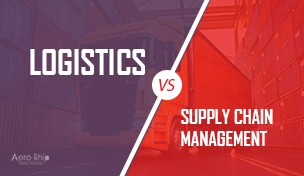
Supply Chain Management is a strategic business function that ensures the effective movement of goods from suppliers to customers, with a focus on customer needs. Logistics includes all movements of goods between coordinating points. Both Supply Chain Management and Logistics exist to facilitate the creation, production, and delivery of products or services, but they have different roles in each process.
Supply Chain Management (SCM) is an umbrella term to describe the orchestration of flows that help create products or provide services for customers to satisfy their needs. The strategy behind SCM encompasses how businesses work with raw materials, distribution centers, suppliers/manufacturers, distribution channels (e.g., retail), and customers (end-users). In supply chains, the objective is to have all companies in a supply chain working together to deliver quality products and services in the manner required by customers. They are responsible for delivering products or services that satisfy customer needs. Supply chains can also be referred to as value chains, depending on whether 'customer-to-customer’ or 'supplier-to-supplier' is being emphasized.
Supply Chains have been growing due to increasing competition, product innovation, and globalization. Some of the key challenges Supply Chain Managers face include:
Logistics (or delivery management) is a key part of how companies get their goods from suppliers to customers. Logistics plays a significant role in Supply Chain Management and is often referred to as part of the supply chain because it helps to ensure that those two functions work well together. The key issues for those who manage logistics - as opposed to the SCM team - are:
Logistics plays a critical role in maintaining value and quality in products across the supply chain. Moreover, it is necessary for businesses to provide good customer service because their reputation depends on it. With rapidly changing customer preferences and demands, we need to understand the relationships – not just between us and our customers – but also among us – between our suppliers and each other – all the way down the supply chain. Logistics can be considered part of Supply Chain Management because it supports other supply chain functions.
But the two are also different. SCM is a strategic function that involves strategic decisions, including strategic planning, strategy implementation, and strategy evaluation. Logistics is considered tactical in the sense that it supports SCM with its focus on execution and control. Moreover, logistics is also a commercial or profit-oriented activity; whereas SCM aims to maximize value for all stakeholders (including shareholders and society).
There are many similarities between supply chain and logistics. The two functions share some common terms and processes, and both of these disciplines need to be able to execute perfectly when the stakes are high. However, there are differences in how each discipline handles production activities, customer service, risk management, ethical issues, etc.
Logistics often falls under the broader umbrella of the supply chain due to its strong relationship with manufacturing practices. Supply chain managers have a much higher level of understanding about how products leave the factory floor before they go on to be used in any way by consumers or businesses. Logisticians may control their own individual inventory levels in order to meet production demands while also overseeing warehouse operations for large-scale stock levels.
In contrast, supply chain managers may control a broader range of supply chain activities. They may also have a direct influence on the production process as well as warehouse operations.
In this way, both groups of professionals need to have a hands-on approach to their work. They must implement changes where necessary and ensure that all of their resources are working as hard as possible on behalf of the business as a whole.
Both supply chain management and logistics professionals work with many different buyers and sellers within their industries.
While the professionals in both sectors need to keep buyers and sellers happy, logistics professionals focus more on customer service and delivery of goods and services. They’re accountable for setting up networks and supply chains in order to meet consumer demands. Supply chain management professionals, on the other hand, maybe asked to come up with growth strategies that will improve efficiency while also contributing to growth.
In this way, supply chain managers can be seen as having a much larger role to play in business growth than logistics specialists do. This is why they are often responsible for coming up with long-term strategies that will dictate where a company goes from here while also making sure that it stays profitable in the process.
Both supply chain management and logistics professionals are constantly working with the latest technology. For example, both of them use software applications to track orders and inventory directly within their own systems. They’re also constantly making use of RFID (Radio-Frequency Identification) technology to streamline operations. This helps them track their inventory levels, optimize warehouse locations, and deliver products on time each time.
While both of these fields do make use of computers for tracking data within their separate systems, they’re more reliant on paper-based systems for coordinating information between different workers.